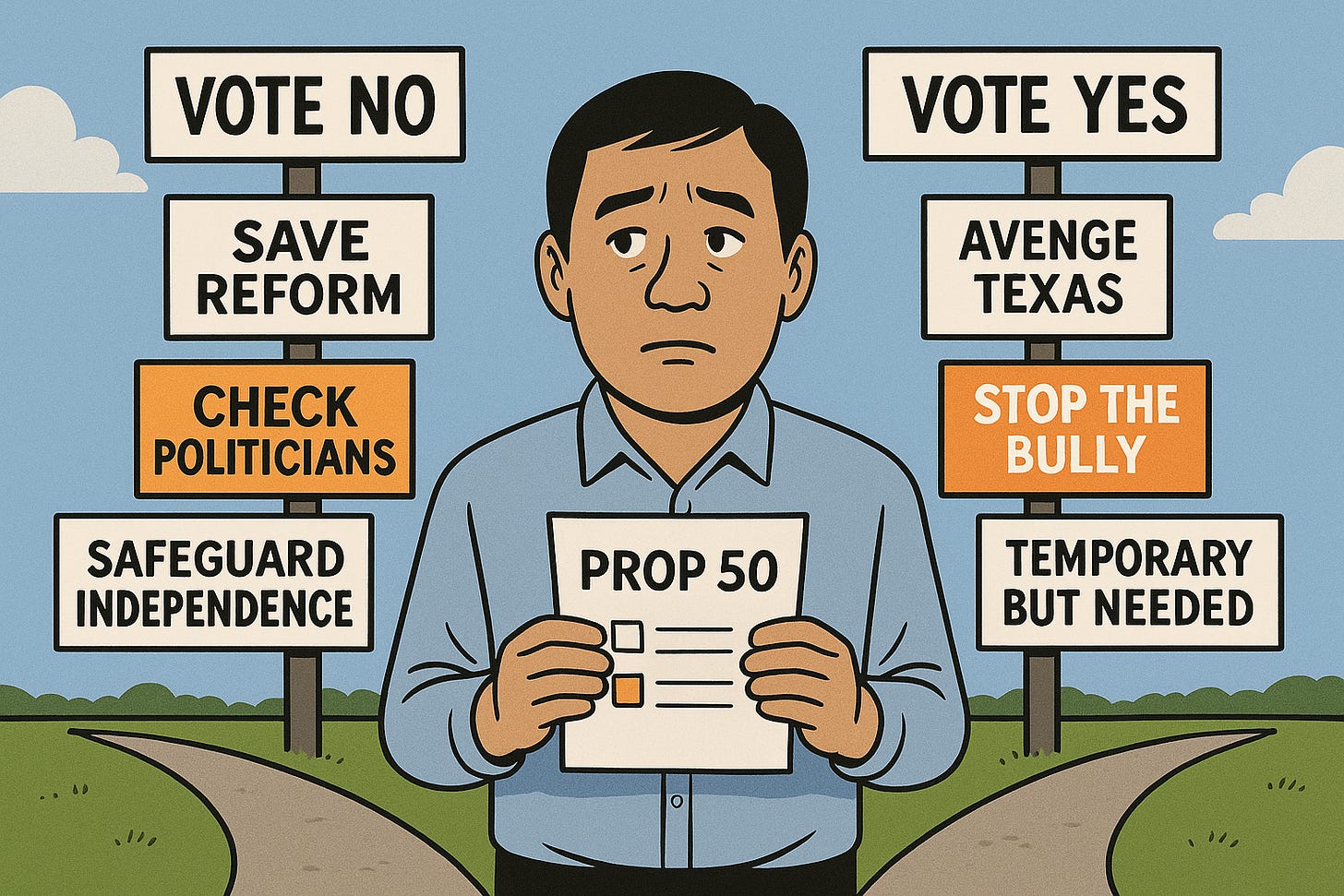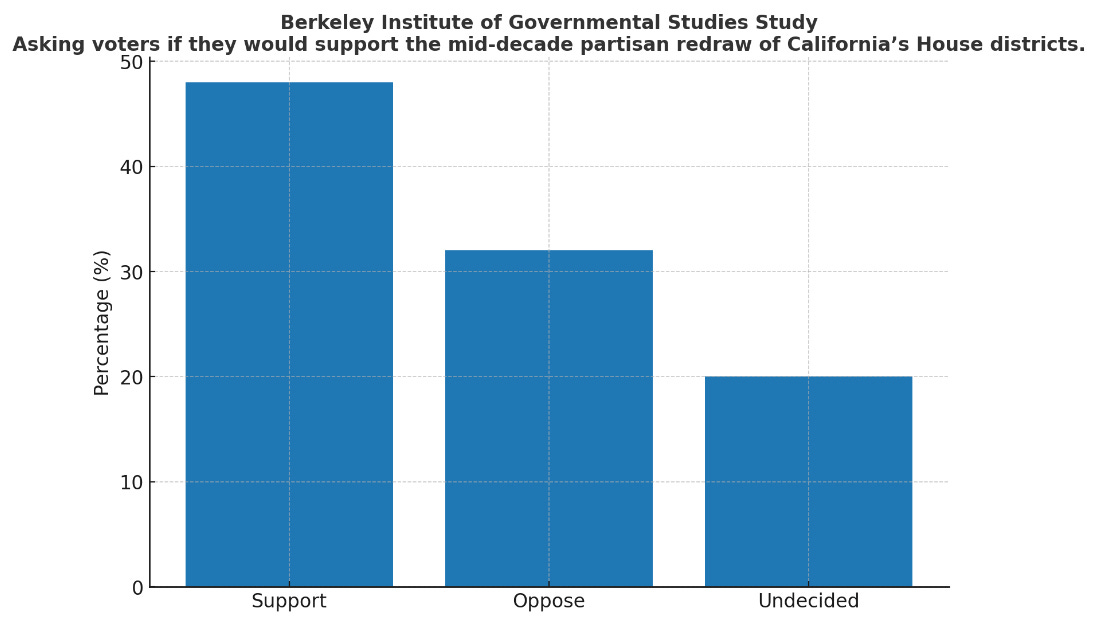Redistricting Special Election: Will Voters Cancel Commission Lines And Vote For Newsom’s Trump Counter-Offensive?
New polling shows Proposition 50 entering the campaign with momentum, but undecided voters hold the key in a lower-turnout special election where partisan intensity could determine the outcome.
⏰ 5 minute read
This is a little long. But I am my own editor, so there was no one to force me to be more concise. - JF
First Off-Year Special Election Since Failure of Newsom Recall
Proposition 50—the constitutional amendment just placed on the November 4 special election ballot—would adopt a new set of Congressional District maps for California for the express purpose of blowing up five of the nine GOP-held seats, and setting the table for Democrats to have a 48 to four lopsided advantage on the massive California delegation. Supporters call it a necessary counter to Republican gerrymandering in Texas. Opponents warn it dismantles a reform Californians fought to protect. With ballots mailed weeks before Election Day, the campaign will play out on a short clock. Like really short.
Last Thursday I had lunch with my friend Matt Rexroad, who was down here in Orange County. We spoke about this whole situation, and from his point of view as a veteran campaign consultant as well as an expert on the politics of redistricting, he sees parallels to the 2021 Newsom recall, which of course was a big blow-out win for Newsom. (California has enough conservatives to qualify a recall, not enough to pass one… That’s a different story…). He was clear that he thinks Prop. 50 passes.
While Matt is convinced the outcome here is not in doubt, I remain less so. Though I think there are a lot of reasons why Newsom’s ballot measure is in a strong position.
One Poll Shows A Big Challenge, Another Makes It Seem Easier — Ballot Language Is A Factor
A Politico–Citrin Center poll released a little less than two weeks ago found 64 percent of Californians favoring the independent commission, with only 36 percent willing to give map-drawing power back to lawmakers. Independents were even more opposed, at 72 percent. Ballot measures starting below 50 percent usually face long odds. But as I wrote at the time, this was a survey with no meaningful background given to those being surveyed, and a very neutral ballot question (the kind a ballot measure should have).
But polling just a few days ago suggests maybe things are a lot different than what was presented in the Politico survey. A Berkeley Institute of Governmental Studies survey (conducted for the Los Angeles Times (who wrote about it here) found 48 percent supportive, 32 percent opposed, and 20 percent undecided. The partisan breakdown as no surprise. Democrats support it 69–31, Republicans oppose it 72–28, and independents remain split. Polling shifts of this kind are common in California ballot fights once campaigns begin spending heavily, underscoring how fluid the numbers can be. But in this case I think the disparity between the results of the two surveys is about what was asked, which I explore below.
(Want to be more poll-confused, Politico on Thursday reported out one question and answer on a national omnibus survey using AI tech showing Democrats nationally support counter-redistricting efforts — which is predicable).
Here is the question asked in the Politico survey:
In both 2008 and 2010, California voters passed initiatives to give an Independent Citizens Redistricting Commission the power to draw the state’s legislative and congressional districts, in order to reduce the influence of politicians. Governor Newsom has suggested returning congressional line drawing authority back to the Legislature, citing concerns that redistricting efforts in Republican states would give them a partisan advantage. Do you… A) Support keeping the independent redistricting commission… B) Support returning congressional redistricting authority to state legislators…
And here is the question asked in the Berkeley IGS survey:
“To counter an effort by the state of Texas to redraw its Congressional district boundary lines to favor Republican candidates ahead of next year’s mid-term elections, Governor Newsom has proposed responding by temporarily changing the way California’s Congressional district boundary lines are drawn for next year’s mid-term elections to make them more favorable to Democratic candidates. In your opinion, do you think the idea of temporarily changing the way California’s Congressional district boundary lines are drawn ahead of next year’s mid-term elections to counter what Texas is doing is a good idea or bad idea?”
You can see why the results might be so different, eh? Wording matters.
The cardinal rule of assessing surveys? You have to first understand what was asked, and to whom it was asked. In this case, the “to whom” appears to be registered voters in both surveys. That is a much broader group of voters than “likely voters” in an off-year special election. My guess is that if you actually surveyed the highest propensity voters, to get closer to an accurate turn-out model, the measure fares even better than in these surveys.
Newsom-Ally Bonta To Write Important Ballot Language
Now that we’ve talked about how significant the ballot title, summary and question are — they still haven’t been finalized. I have been told that those are supposed to be released by Attorney General Rob Bonta on Wednesday. Bonta is very close to the Governor. As you may recall, Newsom plucked Bonta out of obscurity in the State Assembly to fill a then vacant Attorney General position back in 2021, and Bonta was elected as an appointed incumbent in 2024. He will draft language, almost certainly tested in focus groups by Newsom’s political team. California history shows wording alone can swing results by 5, 10, even 20 points! Expect Proposition 50 to be framed as a “necessary response” to Republican gerrymandering in Texas, where mid-decade redistricting added five GOP seats at Donald Trump’s urging. If you are wondering what kind of foot tapping has to take place to get the best language to Bonta, think about them using something like Signal, but without the part where they inadvertently include a media reporter in the group chat.
Turnout Dynamics Favor the Governor’s Position
This is not a presidential election. It is a standalone November 4 special on an off year, with ballots mailed weeks in advance. Turnout will likely mirror the 2021 recall special election, which was roughly 58 percent of voters. Expect the turnout to be more partisan, on both sides. NPP voters tend to vote in lower numbers, a dynamic that works to Newsom’s advantage. California’s reliable electorate skews Democratic, and Proposition 50’s supporters plan to frame the measure as a referendum on Trump. Anger toward Trump remains a powerful motivator, and nationalizing the issue will really motivate Democratic turnout. That said, you would have to look pretty far back to figure out what happens in California when someone is spending serious resources on voter contact and GOTV besides the Democrats and their allies…
Financial Resources: The Fuel To Frame The Debate
Supporters are beginning to collect a formidable arsenal. The “Yes on 50” campaign—self-branded by proponents as the Election Rigging Response Act—has raised millions: $1 million from SEIU’s state council, big bucks from several high net work individuals, and millions from the House Majority PAC and Newsom’s reelection committee.It has been reported that they have raised over $6 million in the past week. This is just the start.
On the opposition side, philanthropist Charles Munger Jr., the son of the late billionaire Charles Munger, who bankrolled the initiative which created the independent redistricting commission, quickly dropped in $10 million to a political committee after lawmakers advanced Proposition 50. He has pledged to spend whatever it takes. Former House Speaker Kevin McCarthy and former CAGOP Chair Jessica Patterson have also started a fundraising drive.
The battle over messaging will decide everything. Supporters will Proposition 50 is a necessary countermeasure to Trump’s Texas map, essential to preserve congressional balance. Look for them to just keep focusing on Trump throughout.
Opponents will counter that the independent process voters created for House Seats in 2010 was designed precisely to keep politicians out of the process. Those fighting the measure must frame their case around fairness, not partisanship—reminding Republicans, Democrats and independents alike that the commission was established by voters to check political power. Look for them to make a big deal about the self-dealing of legislative leaders who drew themselves sweetheart new seats in open Democratic districts.
I wouldn’t be surprised of between both sides here we are talking about nine figures of spending.
So, Does It Matter?
The 58 county Registrars of Voters have to mail out ballots in 42 days! Talk about a quick election. A lot of people return their ballots quickly, which means be prepared to be bombarded with materials — especially if you are someone who always votes! With the expected strong bias in the ballot language, this is going to put the onus on the opposition to get out there quickly (they know this, already at least one if not two pieces of statewide mail have dropped opposing the measure — which was only just placed on the ballot late last week!). Lower turnout, partisan framing, and favorable ballot language I think give the Yes on 50 campaign an edge here (I thought that before lunch with Matt). But there’s still a very real path to its defeat: if opponents can raise the kind of dollars it takes so that voters understand that they are being manipulated, and hammer themes of fairness, independence, and voter intent, they could stop this. At the risk of sounding repetitive, we have not seen that kind of spending here in blue California in a generation. But then again, the stakes are big…
The consequences stretch far beyond California. Facilitating or stopping a ten vote swing in the House partisan breakdown in the 2026 election could very well decide who controls that chamber. The choice will reveal whether Californians prioritize partisan payback or institutional integrity, and fairness. Or maybe, to be more plain spoken, are voters ready to say that two wrongs make a right?
Bottom Line: While a Herculean effort could still deliver victory for the No on 50 campaign, in a state this overwhelmingly blue, the advantage — at least for now — rests with Newsom and his allies.
Do Newsom’s Presidential Aspirations Lie In The Balance?
I will close by reminding readers about how we even got here in the first place. In mid-June Gavin Newsom pivoted his emerging Presidential campaign strategy to one of being the “Anti-Trump” and has seen a lot of success with that. Democrat activists nationally have been hungering for someone to carry that banner. Every move Newsom makes is filtered through his 2028 ambitions. As I argued in a recent piece:
“All of this with the U.S. House seats is a means to an end. Newsom is singular in his focus… He covets the Presidency.”
A victory on Proposition 50 could elevate him to pole position as the national Democratic leader for the nomination (though it will still be very early). A loss could have the opposite effect and complicate his march toward the White House.
Okay, below the paywall below I have a somewhat lengthy analysis in Q&A format regarding what things look like for potential legal challenges to Prop. 50 in federal court. This is extra content, great stuff, but is offered to our paid subscribers.
Subscribe today and lock in our introductory special—just $5/month or $50/year through Sept. 2 (regularly $7/$70). Free subscribers get most posts, but paid members unlock everything. Support my independent analysis and commentary, where the only person I answer to is you.
Keep reading with a 7-day free trial
Subscribe to FlashReport Presents: So, Does It Matter? On CA Politics! to keep reading this post and get 7 days of free access to the full post archives.




